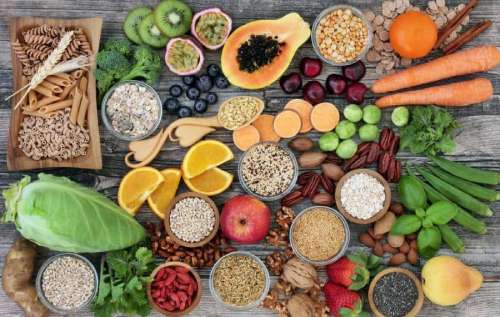So, you have heard that you should eat more plant-based? However, what does that even mean and where to start?
Firstly, why plant-based?
Good question! And I could write for days on this topic. The main point is that our body is designed to mainly thrive on plants.
Yes, we are omnivores, and we can process meat; it’s just taxing on our body. If you open up our insides, they are very different from carnivores. Our small intestine is much longer. Therefore it takes a lot longer for food to work its way through us. Our stomach is not as acidic (which carnivores need to break down animal protein easily).
There’s excellent scientific evidence that many chronic diseases can be controlled, reduced, or even reversed by moving to a whole-food, plant-based diet. Plus, many people enjoy more energy and naturally lose weight.
Then there is the devastating effect that industrial farming is having on our planet. Deforestation, methane production, water consumption, pollution…the list goes on.
What is Plant-Based?
Before you overhaul your fridge, you must understand what you’re planning to get yourself into. What exactly is a plant-based diet? It’s a term that gets thrown around frequently, but many people get the wrong idea most of the time. In simplest terms, plant-based means food that comes from plants and doesn’t include animal products such as meat, dairy and eggs.
So, does going on a plant-based diet means you are stuck with one style of eating? Here’s what’s interesting. You are NOT. Plant-based actually involves plenty of food choices. Yes, your options are restricted to foods that come from plants, however, there are thousands upon thousands of choices available.
Let’s delve a little deeper into a plant-based diet.
Choosing plant-based foods can also mean eating whole foods, which in our opinion is a smart way to go. However, the difference is that a whole food plant-based diet means selecting unprocessed and ‘real’ foods. You can be on a plant-based diet but still eat highly processed veggie burgers and tofu, which we do not advocate for great health.
If you’re choosing a whole food diet, you will omit processed choices and turn to more beans, fruits, whole grains, vegetables, and all the other foods you naturally obtain from nature.

Is Plant-Based Healthy?
The answer to the question above is a resounding “yes!” We all know that eating fruits and vegetables are much healthier compared to a diet without them. But here’s something you should know: not all plant-based foods are healthy. Confusing, right? Well, not really.
If you think about it, it makes a lot of sense. I mean, we’ve got French fries and Oreos – they’re technically vegan. But are they healthy? Not!
So, going on a plant-based diet does not automatically make you healthier. Your food choices and quality are paramount. You can achieve a well-balanced diet and be plant-based, it just takes some planning.
Should You Go Plant-Based or Not?
To help you make a smart decision, let us take a look at the pros and cons of a plant-based diet. First, the pros:
- If you want to lose weight, have a healthier heart, and reduce your risk of acquiring a long list of chronic diseases, choose plant-based.
- Eating more plant produce can improve your energy and mood.
- Science has proven that eating veggies can help you control your appetite, especially those with high fibre content.
- Most of the above benefits are quite well-known. But did you know that eating more plants can help reduce heartburn? Now, you do!
The nutritional benefits of a plant-based diet are why some people chose it. However, sustainability and helping stop inhumane animal killings for food are also big reasons for many individuals.
If there are pros, there must be cons, right? Yes, here are some things to consider:
- You need to eat a large variety of plants to gain all of the nutrients required for optimal health
- You will need to take Vitamin B12 to help support your body if you decide to go purely vegan
- You may need to eat larger portions to satisfy your hunger
- You may need to plan your shopping if you are transitioning to a plant-based diet
The information above should help you begin to understand plant-based diets. Now, it’s time to learn how you can transition from being mostly carnivore to a healthier, more herbivorous meal plan:
1. Get Clear on Your Reasons Why You Want to Eat More Plants
There must have been a reason for you to start going down this path, so connect in with it and go ‘7 why’s deep’. Keep on asking the question why seven times, and you will get to some deep truths. Why do you want to go vegan or even a vegetarian? Why do you need to switch to a plant-based diet? Why is it important that you stick to a healthy, plant-based diet? Why do you think you will benefit from choosing plants?
Keep asking why until you discover the ultimate answer. Use this as your fuel, write your reason down, stick it on the fridge, your bathroom mirror, etc.
This exercise is a significant first step. It’s what you need to continue feeling motivated. Being reminded why you’re doing the transition in the first place makes it easier to give up on the things you normally indulge in, such as ice cream and fast food (salt and sugar).
2. Get the Best Produce Possible
Head down to your local farmers market and do a big shop on the weekend. Why? You will support local farmers, and you’re guaranteed to enjoy produce that tastes amazing. Plus, the fruits and vegetables are more nutrient-dense compared to the ones sold in big supermarkets.
Don’t be afraid to try new fruits and veggies that you haven’t eaten before. Make sure to get your kids involved. Let them pick the plant-based foods that they want. The smell, feel, and look – it’s always a wonderful experience when buying natural foods. They are often colourful and smell pleasant. I’m sure your young ones will love them!
Also, get curious and experiment with different recipes. Check out this blog post that gives you a sample shopping list for detoxification. Everything on the list is plant-based!
Don’t forget to ask where the food comes from when you buy from a farmers’ market in your area. To make sure that you get the most out of your diet, choose only produce in season.
For example:
- Spring: Spinach, peas, cauliflowers, lemons, and avocados (Check out this cool Vegan Avocado Mousse exclusively from Open Space Healing)
- Summer: Blackberries, blueberries, cantaloupe, cherries, cabbage, lettuce, okra, spring onions
- Autumn: Apples, figs, artichokes, celery, corn, cucumber. Zucchini, squash
- Winter: Grapefruit, kiwi fruit, tamarillo, Brussels sprouts, broccoli, fennel, potato
Some fruits and vegetables, such as bananas, radishes, beetroot, and peas, grow all year round. You can buy them no matter what the season.
3. Eat the Rainbow
Yes, we know that you have probably heard it before; however, it’s so important! And nope, we’re not talking about adding more Skittles or M&Ms into your diet!
Eating the rainbow simply means getting a variety of colourful fruits and veggies in your diet. Each colour has its vitamins, antioxidants, and minerals, and you want all of them! Here’s why:
- Red: Watermelons, tomatoes and tomato sauces, red peppers, and strawberries help fight cancer, lower diabetes and heart disease risk, and improve skin texture and quality.
- Orange/Yellow: Oranges, lemons, sweet potatoes, carrots, and mangoes give you healthier eyes, better immunity, and reduced heart disease risk.
- Green: Broccoli, collard greens, kale, avocados, and green apples boost your immunity, detoxify the body, and restore energy.
- Blue and Purple: For reduced inflammation, lower cancer risk, and be more youthful, choose blueberries, red or purple grapes, plums, prunes, and figs.
Look at your plate and if it doesn’t inspire you, then add in some more colour.

4. Eat Until You Are Full
Sounds like common sense, right? However, when going more plant-based, you may need to eat more food to satisfy your hunger. Don’t worry about portion sizes; if you are eating good quality whole fruits and vegetables, it will only benefit your metabolism.
The beauty of a plant-based diet is that the foods involved have fewer calories compared to meat, eggs, cheese, and the like. If you’re among those who don’t feel satiated even after eating a heavy meal, a plant-based diet is a good choice. Because of the high water and fibre content, you will feel full in no time.
5. Plant-based Does Not Equal Processed
One of the main mistakes that we see clients make when deciding to go more plant-based is taking out the animal protein. They then add in processed, nutrient-dead substitutes, such as bread, pasta, baked goods, tofu, fake meat etc. These foods will make you sick! Avoid them as much as you can.
- Mental Hack: Do not think of going plant-based as restricting or ‘missing out’. I like to think of it as a conscious life-giving decision…and make sure that I ADD in ALL the extra things! Like extra seeds and yummy homemade dressings, berries, and nuts.
- Special Note: This is general advice. If you have health challenges, please consult with your primary healthcare provider, trained in nutrition. As with anything in life, continuously keep on checking in with your body and trust your intuition. If eating plant-based isn’t feeling great or working for you, then do what does!
There you have it, our top 5 tips on starting plant-based. Let us know how you go, and please ask questions; we are here to help.
